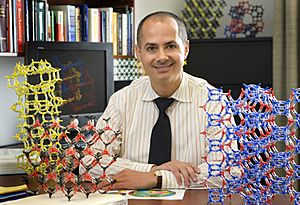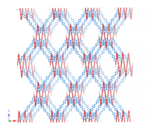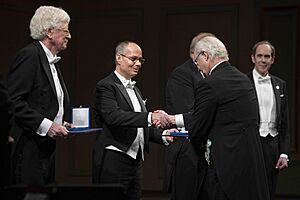Omar M. Yaghi facts for kids
Quick facts for kids
Omar Mwannes Yaghi
|
|
|---|---|
| عمر مونّس ياغي | |

Yaghi in 2008
|
|
| Born | February 9, 1965 |
| Citizenship | Jordanian, Saudi, American |
| Alma mater | University at Albany, SUNY University of Illinois, Urbana-Champaign |
| Awards | AAAS Newcomb Cleveland Prize (2007) RSC Centenary Prize (2010) King Faisal International Prize (2015) Mustafa Prize (2015) Albert Einstein World Award of Science (2017) BBVA Foundation Frontiers of Knowledge Award in Basic Sciences (2018) Wolf Prize in Chemistry (2018) Prince Sultan bin Abdulaziz International Prize for Water (2018) ENI award for Energy (2018) Gregori Aminoff Prize (2019) VinFuture Prize (2021) Wilhelm Exner Medal (2023) Tang Prize (2024) Balzan Prize (2024) |
| Scientific career | |
| Fields | Reticular Chemistry |
| Institutions | |
| Thesis | Synthesis, structure, and reactivity of polyoxovanadates in nonaqueous media (1990) |
| Doctoral advisor | Walter G. Klemperer |
| Other academic advisors | Post-doctoral advisor:
|
Omar M. Yaghi (Arabic: عمر مونّس ياغي; born February 9, 1965) is the James and Neeltje Tretter Chair Professor of Chemistry at the University of California, Berkeley, an affiliate scientist at Lawrence Berkeley National Laboratory, the Founding Director of the Berkeley Global Science Institute, and an elected member of the US National Academy of Sciences as well as the German National Academy of Sciences Leopoldina.
Contents
Early life and education
Yaghi was born in Amman, Jordan in 1965, to a refugee family originally from Mandatory Palestine. He grew up in a household with many children, had limited access to clean water and without electricity. At the age of 15, he moved to the United States at the encouragement of his father. Although he knew little English, he began classes at Hudson Valley Community College, and later transferred to the University at Albany, SUNY to finish his college degree. He began his graduate studies at University of Illinois, Urbana-Champaign and received his PhD in 1990 under the guidance of Walter G. Klemperer. He was a National Science Foundation Postdoctoral Fellow at Harvard University (1990–1992) with Richard H. Holm. In 2021, Yaghi was granted Saudi citizenship.
Academic career
He was on the faculties of Arizona State University (1992–1998) as an assistant professor, the University of Michigan (1999–2006) as the Robert W. Parry Professor of Chemistry, and the University of California, Los Angeles (2007–2012) as the Christopher S. Foote Professor of Chemistry as well as holding the Irving and Jean Stone Chair in Physical Sciences.
In 2012, he moved to the University of California, Berkeley where he is now the James and Neeltje Tretter Professor of Chemistry. He was the director of the Molecular Foundry at Lawrence Berkeley National Laboratory from 2012 through 2013. He is the Founding Director of the Berkeley Global Science Institute. He is also a co-director of the Kavli Energy NanoSciences Institute of the University of California, Berkeley and the Lawrence Berkeley National Laboratory, the California Research Alliance by BASF, as well as the Bakar Institute of Digital Materials for the Planet.
Research
Yaghi pioneered reticular chemistry, a new field of chemistry concerned with stitching molecular building blocks together by strong bonds to make open frameworks.
Metal-Organic Frameworks
His most recognizable work is in the design, synthesis, application, and popularisation of metal-organic frameworks (MOFs). By IUPAC recommendation, MOF is considered a subclass of the coordination polymers first reported in 1959 by Yoshihiko Saito and colleagues. This is followed by E. A. Tomic in 1965 when he published a report titled “Thermal stability of coordination polymers” where he synthesized and characterized many coordination polymers constructed with different ligands and various metal ions. Hans-Peter Werner and colleagues in 1986 published a coordination polymer 2,5-Dimethyl-N,N′-dicyanoquinonediimine and evaluated its electrical conductivity, and in 1989 Bernard Hoskins and Richard Robson (chemist) reported a coordination polymer consisting of three dimensionally linked rod-like segments. In general, coordination polymers are frail disordered structures with poorly defined properties.
In the 1990s, Omar M. Yaghi made three breakthroughs that transformed the traditional coordination polymers into architecturally robust and permanently porous MOFs which are being widely used today: (1) crystallization of metal-organic structures where metal ions are joined by charged organic linkers as exemplified by carboxylates to form strong bonds (Published in 1995); (2) introduction of metal-carboxylate clusters as secondary building units (SBUs), which was the key to building architecturally robust frameworks exhibiting permanent porosity as he proved by measuring for the first time their gas adsorption isotherms (Published in 1998); (3) realization of ultra-high porosity with MOF-5 (Published in 1999). In essence, the strong bonds holding the MOFs allow for their structural robustness, ultra-high porosity, and longevity in industrial applications.
Covalent Organic Frameworks
Omar M. Yaghi published the first paper of covalent organic frameworks (COFs) in 2005, reporting a series of 2D COFs. He reported the design and successful synthesis of COFs by condensation reactions of phenyl diboronic acid (C6H4[B(OH)2]2) and hexahydroxytriphenylene (C18H6(OH)6). Powder X-ray diffraction studies of the highly crystalline products having empirical formulas (C3H2BO)6·(C9H12)1 (COF-1) and C9H4BO2 (COF-5) revealed 2-dimensional expanded porous graphitic layers that have either staggered conformation (COF-1) or eclipsed conformation (COF-5). Their crystal structures are entirely held by strong bonds between B, C, and O atoms to form rigid porous architectures with pore sizes ranging from 7 to 27 Angstroms. COF-1 and COF-5 exhibit high thermal stability (to temperatures up to 500 to 600 °C), permanent porosity, and high surface areas (711 and 1590 square meters per gram, respectively). The synthesis of 3D COFs has been hindered by longstanding practical and conceptual challenges until it was first achieved in 2007 by Omar M. Yaghi.
Yaghi is also known for the design and production of a new class of compounds known as zeolitic imidazolate frameworks (ZIFs). MOFs, COFs, ZIFs are noted for their extremely high surface areas (5640 m2/g for MOF-177) and very low crystalline densities (0.17 g·cm−3 for COF-108).
Molecular Weaving
Yaghi also pioneered molecular weaving, and synthesized the world’s first material woven at the atomic and molecular levels (COF-505).
He has been leading the effort in applying these materials in clean energy technologies including hydrogen and methane storage, carbon dioxide capture and storage, as well as harvesting water from desert air.
According to a Thomson Reuters analysis, Yaghi was the second most cited chemist in the world from 2000–2010.
Entrepreneurship
In 2020, Yaghi founded Atoco, a California-based startup, aiming to commercialize the latest advancements and discoveries by Yaghi in MOFs and COFs technologies in the field of carbon capture and atmospheric water harvesting.
In 2021, Yaghi co-founded another startup called H2MOF, dedicated to solving the challenges associated with hydrogen storage by utilizing the latest discoveries by Yaghi in the field of reticular chemistry.
Honors and awards
Yaghi has received several global awards and medals throughout his career, including the Albert Einstein World Award of Science in 2017; the Wolf Prize in Chemistry in 2018; the Gregory Aminoff Prize in 2019; the VinFuture Prize in 2022, and the Science for the Future Ernest Solvay Prize in 2024. The following are among the key awards, medals and recognitions Yaghi received:
- 1998 Solid State Chemistry Award of the American Chemical Society and Exxon Co. for his accomplishments in the design and synthesis of new materials
- 2004 Sacconi Medal of the Italian Chemical Society
- 2007 US Department of Energy Hydrogen Program Award for his work on hydrogen storage
- 2007 Materials Research Society Medal for his work in the theory, design, synthesis and applications of metal-organic frameworks
- 2007 Newcomb Cleveland Prize of the American Association for the Advancement of Science for the best paper published in Science
- 2009 American Chemical Society Chemistry of Materials Award
- 2009 Izatt-Christensen International Award
- 2010 Royal Society of Chemistry Centenary Prize
- 2013 China Nano Award
- 2015 King Faisal International Prize in Chemistry
- 2015 Mustafa Prize in Nanoscience and Nanotechnology
- 2016 TÜBA Academy Prize in Basic and Engineering Sciences for establishing Reticular Chemistry
- 2017 Spiers Memorial Award from the Royal Society of Chemistry
- 2017 Medal of Excellence of the First Order bestowed by King Abdullah II
- 2017 Japan Society of Coordination Chemistry International Award
- 2017 Bailar Medal in Inorganic Chemistry
- 2017 Kuwait Prize in Fundamental Sciences
- 2017 Albert Einstein World Award of Science conferred by the World Cultural Council
- 2018 BBVA Foundation Frontiers of Knowledge Award in Basic Sciences for pioneering Reticular Chemistry
- 2018 Wolf Prize in Chemistry for pioneering reticular chemistry via metal-organic frameworks and covalent organic frameworks
- 2018 his work on water harvesting from desert air using metal-organic frameworks showcased by the World Economic Forum in Switzerland as one of the top 10 emerging technologies
- 2018 Prince Sultan bin Abdulaziz International Prize for Water
- 2018 Eni Award in recognition of his work in applying framework chemistry to clean energy solutions including methane storage, carbon dioxide capture and conversion, and water harvesting from desert air
- 2019 Gregori Aminoff Prize by the Royal Swedish Academy of Sciences for the development of reticular chemistry
- 2019 MBR Medal for Scientific Excellence of the United Arab Emirates
- 2019 Nano Research Award
- 2020 August-Wilhelm-von-Hofmann-Denkmünze gold medal of the German Chemical Society for his contribution to reticular chemistry and for pioneering MOFs, COFs, and molecular weaving
- 2020 Royal Society of Chemistry Sustainable Water Award for his impactful development of water harvesting from desert air using metal–organic frameworks
- 2021 Belgium’s International Solvay Chair in Chemistry
- 2021 Ertl Lecture Award by the Fritz Haber Institute of the Max Planck Society and Berlin universities
- 2022 VinFuture Prize for Outstanding Achievements in Emerging Fields in recognition of his pioneering Reticular Chemistry
- 2023 Wilhelm Exner Medal of Austria for his direct impact on business and industry through his scientific achievements
- 2024 Science for the Future Ernest Solvay Prize of Belgium in recognition of his pioneering work in reticular chemistry
- 2024 Tang Prize in sustainable development for his work in reticular chemistry
- 2024 Ullyot Public Affairs Lecture and Award of the Science History Institute
- 2024 Balzan Prize for Nanoporous Materials for Environmental Applications for his pioneering MOFs and COFs
See also
 In Spanish: Omar M. Yaghi para niños
In Spanish: Omar M. Yaghi para niños






